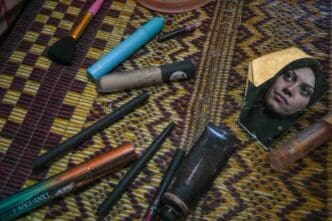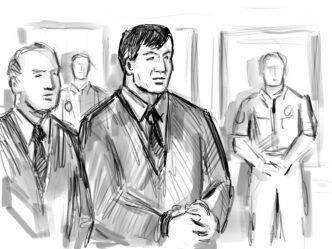In the crowded tent camps of Gaza, women face the daily struggle of living without privacy, adding to the hardships of an already difficult life.
In Gaza’s sprawling tent camps, the absence of privacy is an ongoing challenge for women. Alaa Hamami, a young mother, constantly wears her prayer shawl, not just for prayers but also for modesty around men, even while sleeping. The lack of privacy affects all aspects of life, from dressing to performing basic hygiene.
“Our whole lives have become prayer clothes, even to the market we wear it,” Hamami explains, emphasizing the loss of dignity as she and others adapt to life under dire circumstances. This necessity arises from the ongoing conflict, which has displaced more than 90% of Gaza’s 2.3 million people, leading to overcrowded and unsanitary living conditions.
Sewage runs in streets, food and water are scarce, and winter intensifies the suffering. The tents, often shared with extended families and neighbors, offer no refuge from prying eyes, making women feel constantly exposed.
The conservative nature of Gazan society further complicates matters. Modesty is a deeply held value, but the camp’s conditions force women to compromise on cultural norms. Discussion of women’s health issues is avoided, yet access to basic necessities like menstrual products is severely limited.
Wafaa Nasrallah, another displaced mother, describes resorting to improvised sanitary solutions due to unaffordable prices. She says, “A packet of pads costs 45 shekels ($12), and there is not even five shekels in the whole tent.” The situation is echoed by Doaa Hellis, who uses torn clothing for menstrual needs due to the lack of supplies.
The United Nations highlights that over 690,000 women and girls in Gaza require menstrual hygiene products, clean water, and toilets—needs that aid workers struggle to fulfill as supplies dwindle. The stress of displacement and harsh living conditions have taken a toll on women’s health, both physically and mentally.
Amal Seyam, director of the Women’s Affairs Center in Gaza, warns of the health risks posed by the unhygienic conditions. “Imagine what a woman in Gaza feels like, if she’s unable to control conditions related to hygiene and menstrual cycles,” she says, noting the potential for disease and psychological impact.
The conflict’s effect extends beyond sanitation. According to Seyam, the war exacerbates issues like early marriage as girls seek escape from crowded family environments. This and other impacts mark a severe humanitarian crisis where women bear a disproportionate share of the suffering.
The ongoing conflict has led to a staggering number of fatalities, with over 45,000 Palestinians killed, predominantly women and children. The assault, initiated by Israel following an attack by Hamas, has devastated Gaza’s infrastructure, exacerbating the plight of its inhabitants.
Alaa Hamami, reflecting on her rapidly changed life, holds onto fragments of her past life. With her belongings dwindled to a few personal items, she shares her tent with 13 family members and recounts cherished memories of freedom now lost. “Women lost their being and everything in this war,” Hamami asserts.
The living conditions in Gaza’s camps are a stark reflection of the severe humanitarian crisis unfolding in the region. Women stand at the forefront of this struggle, contending with both the loss of privacy and dignity. As Gaza’s conflict continues to reshape daily life, the plight of its women underscores the urgent need for humanitarian aid and resolution.
Source: News4jax








